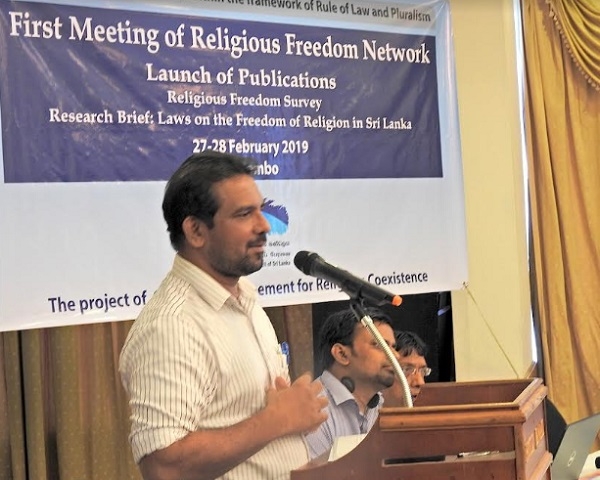As part of its on going intervention on inter religious coexistence, NPC commissioned a survey, conducted in the 25 districts of the country, to capture the level of freedom each community enjoys to practice its religion.
The participants of the survey were religious leaders from all five religious groups, government officials, police and local community leaders from the five main religious groups, who were asked about the status of religious freedom in their respective areas.
The results of the survey, which was carried out by Dr Pradeep Peris and his team under NPC’s project Collective Engagement for Religious Freedom (CERF), were presented partners, NGO representatives and diplomats.
Speaking at the launch of the survey report, NPC Chairman Dr Joe William said that although religious coexistence was to be found in many parts of Sri Lanka, there had been several incidents disturbing it. He said the survey would give an idea of the actual situation and would be used to promote greater religious coexistence and respect for pluralism and the rule of law.
NPC Executive Director Dr Jehan Perera said members of NPC’s District Inter Religious Committees (DIRCs) were at the forefront to implementing ideas such as pluralism, respecting rule of law and promoting religious coexistence.
For 10 years, DIRCs had worked at district level with religious leaders and empowered them to engage in conflict resolution activities. Now work was also being carried out at divisional levels with the four pillars - religious clergy, government administration, police and civil society - Dr Perera pointed out.
Presenting his findings, Dr Peris said that the participants had spoken about their experiences, perceptions and fears. They were asked about their feeling on religious freedom in the country and also in their own areas.
He said the main objective was to help NPC’s work on inter religious dialogue. There were certain dilemmas and puzzles that were revealed and NPC should analyse them and come up with solutions, he pointed out.
Key findings of the Religious Freedom Survey:
- Most local leaders believe people live peacefully helping each other and 27 per cent say people live peacefully but there is little interaction among some religious communities. Five per cent of local leaders feel there is some tension between religious communities. People in the Kurunegala District and the Eastern Province did not feel communities lived peacefully.
- Sixty two per cent said there is no obstacle to practicing their religion in the country but 27 per cent said they could not always practice their religion freely. More than one third said their religion cannot be practiced freely in the country – 50 per cent Muslims, 40 per cent Christians and 35 per cent Hindus.
- In their own area where they live, 83 per cent said there is no obstacle to practicing their religion, showing that fears about religious freedom is felt on a national level rather than through everyday life experiences. A high percentage of people in Batticaloa, Ampara, Trincomalee, Jaffna and Kurunegala districts said they could not always practice their religion freely.
- The main reasons for religious freedom people experienced in their areas are that there had not been any obstacles in the past, the community respects all religions and there is a good understanding among religious leaders. The law enforcement mechanism is not seen as a contributing factor.
- Among the insecurities experienced by religious communities is conversion of their religious community to other faiths, which is largely a concern of Buddhists, Hindus and Catholics. In the districts of Mannar, Batticaloa, Ampara, Kandy, Matale and Hambantota, the level of insecurity over their own culture is high.
- Communities are insecure about the future of their power status, freedom to practice their religion and their demographic strength in the future. Buddhists are most concerned about their demographic strength while Muslims are the least concerned. Hindus harbour the highest level of insecurity about their future. People in the districts of Batticaloa, Ampara, Nuwara Eliya, Ratnapura and Kalutara are most insecure about the future of their respective religions.

